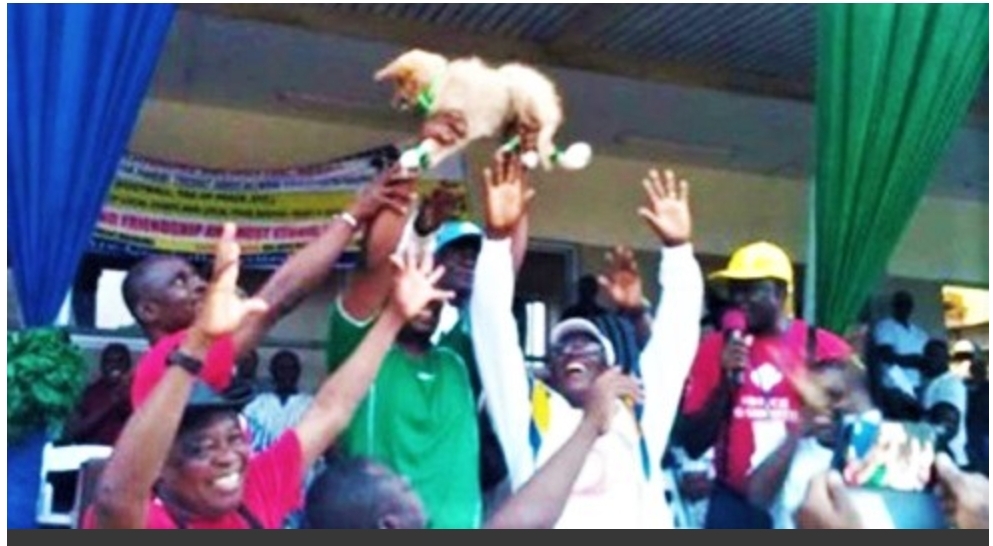On Saturday September 3, 2022, the Frafras and Dagaaba, who, geographically, hail from the northeastern and northwestern parts of Ghana, respectively, celebrated their 25th annual comradeship games.
The games are organised by members of the two tribes who live in and around Accra. The symbol of the Frafra/Dagaaba unity is a dog, so a puppy is the overall winning prize at these games.
However, make no mistake, the symbolism of the dog here is not in the sense of the mascot of a sports team; it is a delicacy they both enjoy. Please! Those whose judgement alarms are already going off, just don’t, we are not alone, animal rights activists almost derailed South Korea’s bid to host the 2002 soccer world cup for having a similar palate.
The origin of the Frafra/Dagaaba relationship is unknown, but various legends assign them the ancestry of two brothers who split on a dispute over the head of a dog. According to one of the legends, during one of the droughts of the savannah, the brothers had to kill their companion animal, the dog, for food. Somehow, the head of the dog got missing leading to accusation and counter accusation.
This conflict caused them to break up — the Dagao headed west and the Frafra went east. But evidently, they have both gotten over the pain of the missing dog head and it has since become the underlying theme of their jokes and friendship.
The delightful relationship between the two tribes has been applauded as something worth emulating by all tribes in an ethnically diverse country, where ethnic differences have historically and continue be a source of tension, especially around partisan politics.
The Frafras and Dagaaba greet one another with playful jokes, which would normally appear to an unsuspecting onlooker as highly disrespectful and deprecating; but they end in big laughs and hugs.
However, sometimes, it can be frustrating, especially when one is in the middle of serious business, or one’s sense of play is unavailable in that moment.
Dog
Among the Frafras and Dagaaba, the dog remains a companion animal. As a Frafra myself, I remember growing up in Bolgatanga, almost every household had a dog in my neighbourhood.
Mostly, the youngest boy in each family was the chaperon of the dog, and we took pride among our peers, in bragging about whose dog was the most trained and fearful in the neighbourhood.
The dog has also historically served as a companion, accompanying people to their farms; and as security for the home, giving members of the household a peace of mind that the home is safe from intruders while they are away.
Food of choice
The presence of the dog is also believed to ward off bad spirits, such as, witches and ghosts. However, in other instances, the dog becomes the food of choice for celebratory purposes.
For instance, when a man marries a wife and wishes to entertain his friends and thank his wife’s brothers for ‘giving’ their sister to him, a dog is slaughtered for the feast.
For the Frafras and Dagaaba, even if the nature of our affective relation with the dog is not as intimate as what we see in Western cultures, where dogs occupy a place almost next to children, should that lessen our moral relational obligation?
Some may argue that they do not have a personal relation with the dog. I have responded to this in conversations with friends with the suggestion that we should collectively recognise the flourishing of these animals out of solidarity (based on our common humanity) with those for whom these animals are more-than-animal.
It is important to consider other people’s interests, especially that we now live in an unprecedented wall-to-wall global world.
Backlash
Recently, Rev. Eastwood Anaba suffered an unmerited backlash, to the extent that he had to deliver a public apology, when he commented on the dog eating habit of the people of the Bolgatanga.
In my opinion, no one has earned the right to run commentary on the social life of the area and, even, diagnose its ailments than Rev. Anaba. I think the Rev. was referring to the broader social dysfunction that comes with dog meat consumption in the area.
The reality is that dog meat has never been a mainstream part of the diet of the Frafras and Dagaaba, it is not something that is prepared at home as a family meal. The practice is gendered and, in fact, an act of conspicuous consumption.
Just like alcohol consumption, dog meat consumption occurs in outdoor spaces that exclude women and children: the two typically go together.
Unsurprisingly, the patriarchal relational nature of the practice leads to the deprivation of women and children of a dignified life as the family income is disproportionately used by men to fund their outdoor lifestyles.
So, I think, Rev. Anaba, had the social dysfunction of this household scale marginalisation and the broader societal problem of excessive alcohol consumption in mind when he condemned the practice.
I am not trying to invite upon myself, the Wa Chief Palace public flogging.
Instead, I am inviting you to a public reasoning in an openly impartial way — engaging worldviews from far and near —beyond the usual quick dismissal of positions such as this under the banner of ‘our culture’ — lets scape the trap of local parochialism.
The writer is an Assistant Professor of Environmental Sciences and Studies, Stonehill College, Massachusetts, U.S.A.
